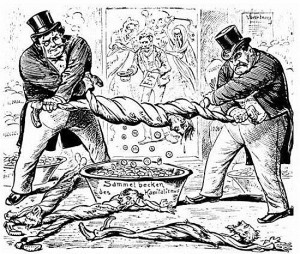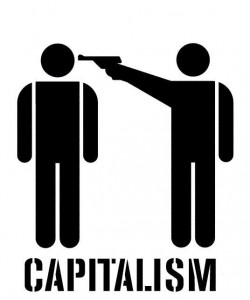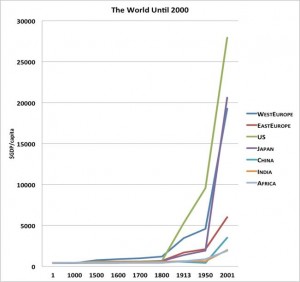This page was designed in 2016 to host the website for a book that
will never be written:
Three Stories about Capitalism: The moral psychology of economic life
by Jonathan Haidt, NYU-Stern School of Business.
[About the author: Wikipedia page, and NYU Homepage]
I had planned to write the book in 2016 but instead, universities blew up in 2015 and so I wrote The Coddling of the American Mind instead (with Greg Lukianoff). Then I planned to return to it in 2021, but as I dug more deeply into teen mental health, i realized that the story was so big that i had to write a whole book on that: The Anxious Generation. I now realize that I will never write this book on capitalism, but I leave up this website because I love the idea and I hope someone else will write something like it.
Precis, from the book proposal:
Capitalism is perhaps the most consequential thing humanity is thinking about these days, as we witness the astonishing escape from poverty of billions of people in a single generation, the spectacular frauds and blunders that nearly led to a global economic collapse, and the precipitous rise in income inequality occurring within many nations. Any country that gets capitalism right will prosper; the costs of getting it wrong are immense. My goal is to write a book that will help people think about capitalism, business, prosperity, and ethics, not just in North America and Europe, but in the world’s many rapidly developing countries, where I am finding that there is a great interest in understanding the relationships between morality, prosperity, and society.
It can be difficult to think about capitalism because—like Darwin’s theory of evolution— it is a powerful idea that has become politicized. The topic automatically activates moral concerns and emotions in many people. There has long been a thoroughly negative story about commerce, going back to biblical times, in which businessmen, traders, and money lenders are bloodsuckers who extort wealth from workers and customers without contributing anything of value. When mercantile capitalism came along in the 16th century, and even more so when industrial capitalism conquered the globe in the 19th century, the negative story began to animate left-leaning parties and revolutionaries in many countries—with history-shaping consequences for the 20th century. This is story #1: Capitalism is exploitation. It is a curse, a virus, a disaster for the poor and the planet. This story is still told today, as we saw in the Occupy Wall Street movement.
But capitalism has also had its passionate defenders, most notably Adam Smith in the 18th century, who explained how capitalism achieves the magic of value creation (as in his famous example of a pin factory). The rising wealth, longevity, and living standards of the 19th and 20th centuries—even for the poor and working class—led to the formation of a thoroughly positive story about capitalism, told by economists such as Friedrich Hayek, Ludwig von Mises, and Milton Friedman. This is story #2: Capitalism is liberation. Free market capitalism is Prometheus, giving fire and freedom to the human race. In this story, it is left-leaning ideologies (socialism, Marxism, and the affection for big government) that continually attack human progress, disconnecting whole nations from the market and dragging them down into poverty for decades—until they see the light, as China and India did a few decades ago.
My goal is to tell these first two stories fully and fairly. I’ll delve into history and economics, but the main approach I’ll take to capitalism is moral psychology. The exploitation and liberation stories are above all moral stories, driven by moral intuitions, and intimately bound up with political agendas. Three Stories about Capitalism continues the themes introduced in my last book, The Righteous Mind. I’ll present the three basic principles of moral psychology and show how each one helps us understand the wildly different views of capitalism held by progressives, conservatives, and libertarians.
After telling the exploitation and liberation stories, I’ll tell the third story about capitalism – a more balanced and integrated story – that is taking shape among diverse thinkers in the early 21st century. This story starts with the liberation story but then takes seriously the critiques of the exploitation story. It takes it as demonstrated that free markets are the most powerful engines of prosperity, and are essential for ending world poverty. But in this story, there is no idolatry of markets.
Rather, it’s a story about humanity’s discovery of something very good, very powerful, and sometimes dangerous, which transformed our minds as extensively as it is transforming our planet. In the 21st century, we may come to understand capitalism and the human mind well enough to better control our own destiny. We may attain forms of capitalism that exemplify dynamism with decency.
Very tentative outline of the book:
Introduction: The Hundred Trillion Dollar Question: What is a Flourishing Capitalist Society in the 21st Century?
Part I: The Big Picture
Ch 1: Wicked Problems, Competing Stories
Ch 2: We are Designed for Dynamism and (Selective) Decency
Ch 3: A Very Short History of Capitalism
Ch. 4: What Capitalism Does to Us
Part II: The Ethical Toolbox
Ch 5: Fairness and Equality
Ch. 6: Liberty and Property
Ch. 7: Dignity and Exploitation
Ch. 8: Inequality
Part III: Capitalism For The 21st Century
Ch. 9: Capitalism and Happiness
Ch. 10 Diversity, Immigration, and Populism
Ch. 11: Governance and Welfare States
Ch. 12: The Third Story About Capitalism
For more on the book, and my essays and talks on capitalism and morality, click here.



